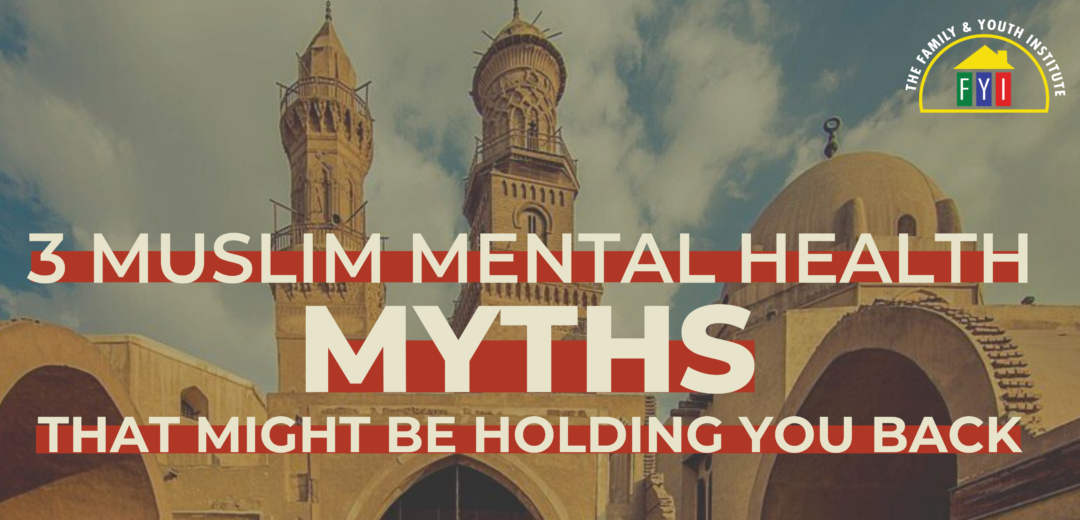
Article written by Issra Killawi with Madiha Tahseen, PhD
When we’re struggling with a mental illness, we sometimes feel alone–often because of the stigma about mental illness in Muslim communities. Sometimes, by the time we do get help, our symptoms have worsened.
To address this issue, Khalid Elzamzamy, MD and Sadiq Patel, MSW (researchers at The FYI ) analyzed our Islamic history and tradition around mental health. In 2015, they presented the findings from their analysis at the Muslim Mental Health Conference through their poster titled “Muslim Historical Contributions to Psychological Theories and Treatment.” In 2019, Dr. Elzamzamy further explored the Islamic legacy of mental health in collaboration with Alaa Mohammad Shareef from The FYI and Dr. Rania Awaad’s Stanford Muslims and Mental Health Lab in an academic paper titled “Mental Health in the Islamic Era: The Golden Roots of Modern Psychiatry.”
Let’s take a look at three myths that might hold us back from getting help with a mental illness, and how the legacy of mental health in Islamic history can help us overcome these misconceptions and address some of the stigma that exists in our community.
MYTH #1: “Muslims don’t have mental health issues.”
Some people think that Muslims are not impacted by mental illness. But research shows that Muslims are in fact struggling with a variety of mental health challenges.
Across a few studies about the mental health of Muslim Americans, 15-25% report anxiety disorders and 9-30% report mood disorders. [1] Other research shows that young Muslims struggle with depression at rates that are similar to non-Muslim youth [2], especially if they have to balance different identities like being Muslim and American. [3]
While being Muslim doesn’t make us immune to these challenges, our spirituality can be a powerful tool on the journey towards coping and healing. Especially when we are struggling, Allah(SWT) teaches us to call out to Him with names that reassure us of His care and love for us in the most intimate ways. For the anxious person, Allah is Ar-Raqeeb – the ever-watchful, always looking out for us. For the broken-hearted, He is Al-Jabbar, the mender of broken hearts.

When dealing with others who are struggling with emotional pain, the Prophet (PBUH) taught us to care and listen with a non-judgemental ear–or what’s now called “holding space”. In fact, this was one of the reasons that people loved the Prophet (PBUH) so much. They always felt heard and cared for by him, especially in their most vulnerable states. When emulating the Prophet, we should embody this by holding space for others, especially those who may be experiencing a challenge with their mental health.
MYTH #2: “Dealing with a mental illness is a sign of weak faith.”
Some people within our communities believe that a person who is struggling with mental illness has weak faith or doesn’t have enough trust in Allah (SWT). But people can experience mental illness because of biological reasons, like genetics or an imbalance of chemicals in the brain. For others, mental illness can be a response to trauma or other experiences they are struggling to cope with. And for many, mental illness can be brought on by a combination of these factors.
Centuries ago, a Muslim scholar named Abu Zayd Al-Balkhi, affirmed this reality. He argued that humans are composed of a body and a psyche, and that we can face health and sickness in both of them. The same way our bodies experience fever, headaches, and pain, our minds can experience psychological symptoms such as anger, sorrow, fear, and panic. Muslim scholars like Al-Balkhi recognized that mental illness was an affliction to be treated, not a sin to be met with punishment or shame. For a comprehensive guide on seeking therapy, check out The FYI’s Therapy Guide.
When we look to our Prophet Muhammad (PBUH), the strongest in faith, we see that even he was tested with emotional hardships. The Prophet was boycotted by his own people, then lost his uncle and his wife who were his greatest source of support. He was stoned by the people of Taif when he tried to invite them to Islam. This period was called the Year of Sadness, one of the most difficult times in the Prophet (PBUH)’s life. It was a year of difficulty, not just a few days! The Prophet Yaqub (Jacob) AS was also tested with incredible sadness for years and years, so much so that his eyes turned blind with grief while he waited for news about his son, Yusuf (AS).
The prophets experienced deep emotional distress and difficulty, but this was certainly not a reflection of how little faith they had. In fact, their ability to move through their tribulations was through the strength of their deep faith.
MYTH #3: “The field of mental health is a modern invention and not a part of our tradition as Muslims.”
We may think of mental health as a modern concept that isn’t rooted in our Islamic tradition. But historically speaking, mental health has long been a part of our Islamic legacy. Muslims scholars have made major contributions to the fields of psychology and psychiatry? Scholars like Al-Balkhi, Al-Razi, Al-Ghazali, Ibn Al-Jawzi, and Ibn Sina wrote entire volumes about emotions, mind-body connection, mental disorders, and psychological treatments.
It was their work that inspired the first-ever psychiatric hospitals in the world – like the Bimaristan of Baghdad in the 8th century and Qalawun Hospital in Cairo in the 14th century. These hospitals offered holistic treatments like medication, music therapy, physical therapy, and story-telling. Because caring for those who were ill or in need was seen as a societal obligation in the Islamic tradition, these treatment centers were often funded by the Islamic state through Zakat funds. They were usually located in the center of town, where those seeking treatment could be visited by family and supported by the community rather than be isolated and stigmatized.

So as you can see, caring for our mental health is essential to our faith and an important part of our legacy as Muslims. The Prophet (PBUH) himself taught us to ask Allah’s protection from psychological symptoms and stressors we might encounter every day – like feeling sad, worried, lazy or inadequate. He also advised us to seek healing from anything that is harming our well-being, including our mental health. If you’re someone who’s struggling with your mental health, take the Prophet’s advice, peace be upon him, and seek out help when you need it.
Share this article with others to raise awareness about mental health.
Recognizing and reclaiming our legacy on mental health is just one way to reduce stigma on mental illness in our communities.
For much more information about our rich history in mental health, click here.
For many more resources to support your mental health, visit www.TheFYI.org.
References:
- Aftab A., & Khandai, C. (2018). Mental Health Facts for Muslim Americans. APA Division of Diversity and Health Equity, Washington, DC.
- Basit A, & Hamid M. (2006). Mental health issues of Muslim Americans. The Journal of Islamic Medical Association of North America, 42(3), 106-110.
- Desouky, T., & Umarji, O. (2021). The impact of Muslim religiosity on well-being outcomes. Yaqeen Institute for Islamic Research. https://yaqeeninstitute.org/read/data/reports/a-holistic-view-of-muslim-religiosity-introducing-basic.
- Wilhelm, A. K., McRee, A., Bonilla, Z. E., & Eisenberg, M. E. (2018). Mental health in Somali youth in the United States: The role of protective factors in preventing depressive symptoms, suicidality, and self-injury. Ethnicity & Health, 26 (4): 530-553.
- Tahseen, M., & Cheah, C. S. L. (2018). Who Am I? The social identities of Muslim-American adolescents. American Journal of Islamic Social Sciences, 35(1), 31-54.

